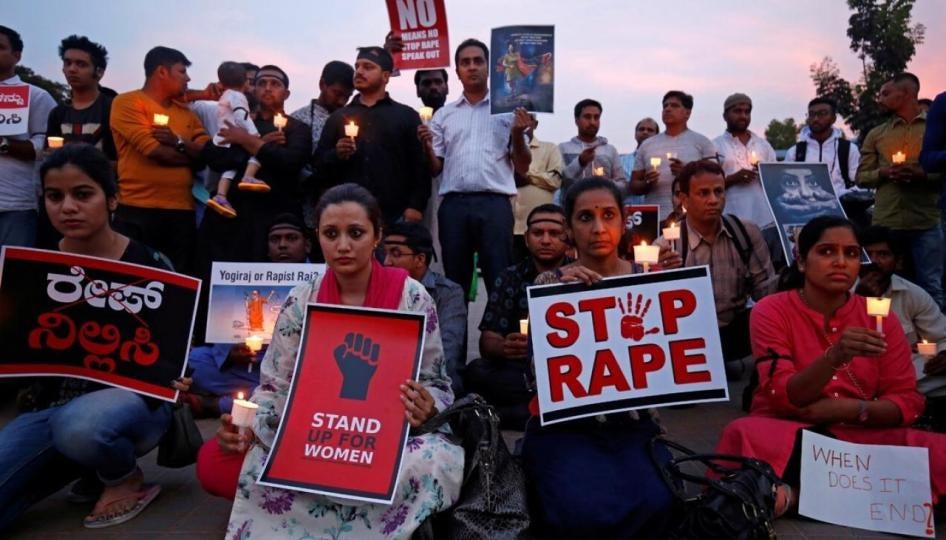India is witnessing the latest advance in women’s fight for workplace equality and dignity. Women in India have furiously taken to social media using the #MeToo hashtag to publicize accounts of workplace sexual harassment. Some of these have been bottled up for decades.
These brave women are breaching a huge wall of silence and stigma. From Bollywood celebrities to prominent journalists and authors to leaders of nongovernmental organizations, it’s been a cathartic outpouring of women’s grievances.
What’s remarkable about this new wave of naming and shaming is that critics cannot easily brush them aside. Most of the grievances shared publicly provide excruciatingly painful detail about what women endured.
Yet, as we have already seen in the U.S. and in other countries where #MeToo has taken hold, whether those implicated will be held accountable — and how — is the big question. The laws, and how the authorities enforce them, can make a big difference in whether powerful men who use their power to harass women can also use legal intimidation tactics to fend off their accusers.
The Process Is the Punishment
These issues have been central in the case of M.J. Akbar, the minister of state for external affairs in the Narendra Modi government.
Akbar was long revered for his astute journalism. But in early October, he was publicly pilloried with complaints about workplace sexual misconduct from his journalism years. Within days, 14 women wrote about their experiences involving Akbar.
Akbar denied the allegations and contended that they were malicious. He made no offer to cooperate with any investigations or inquiries.
Instead, he adopted a chilling legal strategy, filing a criminal defamation case against Priya Ramani, a prominent woman journalist who first wrote about him. A relic of the British colonial period, India’s criminal defamation law carries up to two years in prison and a fine. With the backing of one of India’s top law firms, Akbar brought a criminal investigation to bear against Ramani. This is different from a civil defamation suit, which provides damages for harm suffered.
Indian journalists and women’s rights activists have banded together with an outpouring of support to make sure Ramani has the resources she’ll need to take on the legal battle. In India, cases of criminal defamation can be arduous, long, and expensive. The court hearings can drag on. The process itself is the punishment.
Women journalists petitioned the president of India to intervene and ensure that Akbar would step down and that the Indian government would initiate an independent investigation. But despite its public pledges to protect the rights of women and girls, when faced with allegations against one of its ministers, the government has not spoken publicly on the case.
Akbar’s criminal defamation case helps explain why many women don’t speak up sooner or never bring cases at all.
Defanging Defamation Laws
Breaking down the architecture of legal intimidation is central to the success of laws governing sexual harassment.
India has had Supreme Court Guidelines (known as Vishaka Guidelines) to prevent workplace sexual harassment from as far back as 1997. Subsequently, the Indian women’s rights movement championed a strong law governing workplace sexual harassment in 2013. But the law has been enforced in a woefully inadequate way.
The reasons are many, including the lack of a monitoring system. But dismantling the ability of the accused to retaliate against complainants is key to the enforcement of any credible regime.
If policymakers want to truly empower women to speak fearlessly and bring complaints against workplace sexual harassment, criminal defamation should have no place in a country’s laws. India is not alone in the world in allowing people to bring criminal defamation cases to harass and intimidate victims who write about them. Many countries have these laws.
As the UN expert on freedom of expression and others have recommended, these laws should be repealed, and replaced with civil defamation laws. And until criminal defamation laws are repealed, courts should not allow them to be used as a legal response to complaints of sexual harassment.
But civil defamation cases can also be used for intimidation. Ramani is not the only woman facing a defamation case. Other men accused of workplace sexual harassment in India have slapped women complainants with civil defamation cases. Civil lawsuits may not carry the threat of criminal sanctions, but they still retain their power to intimidate.
Legal systems should ensure that civil defamation actions cannot be misused as tools to intimidate critics of powerful people into silence. These should be appropriately tailored to weigh the public interest in seeing important allegations brought to light. The UN expert on freedom of expression has stated that defamation suits should be limited to the reputational harm wrongly suffered — and that given the high bar for restricting criticism of government officials, they should not be able to bring defamation suits at all. Financial sanctions should not be so large as to have a chilling effect on speech.
In the United States, 27 states have introduced additional protections, commonly known as “Anti-SLAPP” laws. These are legal measures that guard against Strategic Litigation Against Public Participation (SLAPP) — civil lawsuits brought largely for the purpose of burying activists and others in costly litigation. They help the targets of these suits to have the cases easily thrown out of court without being dragged into a lengthy litigation. There is a growing demand in the European Union to introduce anti-SLAPP legislation.
“We’ll See You at the Barricades”
Ramani is fortunate in that she has the backing of hundreds of journalists across India and widespread support of the women’s rights movement. Ramani and the other women refused to back down and have, for now, prevailed. After Akbar accused Ramani of making false and politically motivated allegations, many more journalists came out to bolster her claims against him. One of them, Tushita Patel, wrote, “[E]nough with the legal intimidation — we can see you in court too…. You know who we are. You’ll recognize us when you see us at the barricades.”
Akbar resigned from his position on October 17. Even though the government has taken no public action in the case, it is hard to know to what extent politics played a role behind the scenes in his departure. But he is not dropping his criminal defamation case.
Governments around the world should throw their weight behind the women saying #MeToo and painfully recounting workplace sexual harassment. They should strike down criminal defamation laws and press ahead with protections that make it easier to hold powerful men accountable and harder to retaliate against courageous women who come forward to confront them. India can, and should, lead the way.









